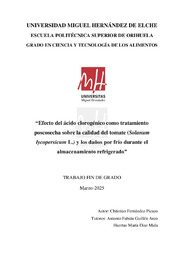Resumen :
El fruto de tomate (Solanum lycopersicum L.) es un fruto perecedero que posee un almacenamiento limitado debido a que es susceptible a daños por frío cuando se conserva en condiciones de refrigeración, las cuales se emplean para retrasar la maduración. Por esta razón, en este estudio se probaron diferentes concentraciones (10, 50 y 100 mg L−1) de ácido clorogénico (ACG) para evaluar su eficacia en el mantenimiento de las características de calidad del fruto y en la mitigación de los síntomas de daños por frío en los tomates. Nuestros resultados mostraron que los tratamientos con ACG retrasaron eficazmente la pérdida de peso y mantuvieron la firmeza del fruto, observándose los mejores resultados a dosis de 50 mg L−1. En general, concentraciones más altas no dieron lugar a mejoras significativas en la calidad. Además, los tomates tratados con ACG mostraron valores reducidos en el contenido de malondialdehído (MDA) y fuga de electrolitos (EL), lo que indica una mejora en la integridad de las membranas y una reducción del daño oxidativo. Los tratamientos con ACG mantuvieron un mayor contenido total de fenoles durante el almacenamiento, con niveles significativos de polifenoles individuales como la rutina, el ácido neoclorogénico y el ácido p-cumárico, lo que sugiere una mayor capacidad antioxidante y una mejor conservación de la calidad del fruto. Esta es la primera vez que se evalúa el potencial del ACG para reducir el impacto de los daños por frío en cualquier especie de fruta, y su impacto en la maduración del tomate demuestra que ayuda a preservar la calidad del fruto durante el almacenamiento en frío, prolongando así su capacidad de almacenamiento. En particular, destacamos su origen natural y su efectividad como tratamiento poscosecha.
The tomato fruit (Solanum lycopersicum L.) is a perishable fruit with limited storage capacity due to its susceptibility to chilling injury when stored under refrigeration conditions, which are commonly used to delay ripening. For this reason, in this study, different concentrations (10, 50, and 100 mg L⁻¹) of chlorogenic acid (CGA) were tested to evaluate its effectiveness in maintaining fruit quality characteristics and mitigating symptoms of chilling injury in tomatoes. Our results showed that CGA treatments effectively delayed weight loss and maintained fruit firmness, with the best results observed at a dose of 50 mg L⁻¹. In general, higher concentrations did not lead to significant improvements in quality. Additionally, CGA-treated tomatoes exhibited reduced malondialdehyde (MDA) content and electrolyte leakage (EL), indicating improved membrane integrity and reduced oxidative damage. CGA treatments maintained a higher total phenolic content during storage, with significant levels of individual polyphenols such as rutin, neochlorogenic acid, and p-coumaric acid, suggesting enhanced antioxidant capacity and better preservation of fruit quality. This is the first time that CGA's potential to reduce the impact of chilling injury has been evaluated in any fruit species, and its impact on tomato ripening demonstrates its ability to preserve fruit quality during cold storage, thereby extending its shelf life. Notably, we highlight its natural origin and effectiveness as a postharvest treatment.
|
 La licencia se describe como: Atribución-NonComercial-NoDerivada 4.0 Internacional.
La licencia se describe como: Atribución-NonComercial-NoDerivada 4.0 Internacional.
.png)
